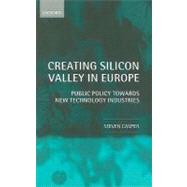
Note: Supplemental materials are not guaranteed with Rental or Used book purchases.
Purchase Benefits
Looking to rent a book? Rent Creating Silicon Valley in Europe Public Policy Towards New Technology Industries in Comparative Perspective [ISBN: 9780199269525] for the semester, quarter, and short term or search our site for other textbooks by Casper, Steven. Renting a textbook can save you up to 90% from the cost of buying.
| List of Figures | p. viii |
| List of Tables | p. ix |
| Acknowledgments | p. x |
| Introduction | p. 1 |
| Varieties of Capitalism and Innovation: The Silicon Valley Model | p. 15 |
| How an American Technology Cluster Emerged and Became Sustainable: San Diego Biotechnology | p. 44 |
| The German Biotechnology Industry: The Limits of Orchestrated Innovation | p. 74 |
| Biotechnology in the UK: Good but Not Great | p. 105 |
| Alternative Pathways to Competitiveness within CMEs: The Subsector Specialization Argument | p. 133 |
| Regional Strategies to Sustain Radical Innovation: Internet Software | p. 156 |
| Conclusion | p. 177 |
| References | p. 192 |
| Index | p. 204 |
| Table of Contents provided by Ingram. All Rights Reserved. |
The New copy of this book will include any supplemental materials advertised. Please check the title of the book to determine if it should include any access cards, study guides, lab manuals, CDs, etc.
The Used, Rental and eBook copies of this book are not guaranteed to include any supplemental materials. Typically, only the book itself is included. This is true even if the title states it includes any access cards, study guides, lab manuals, CDs, etc.